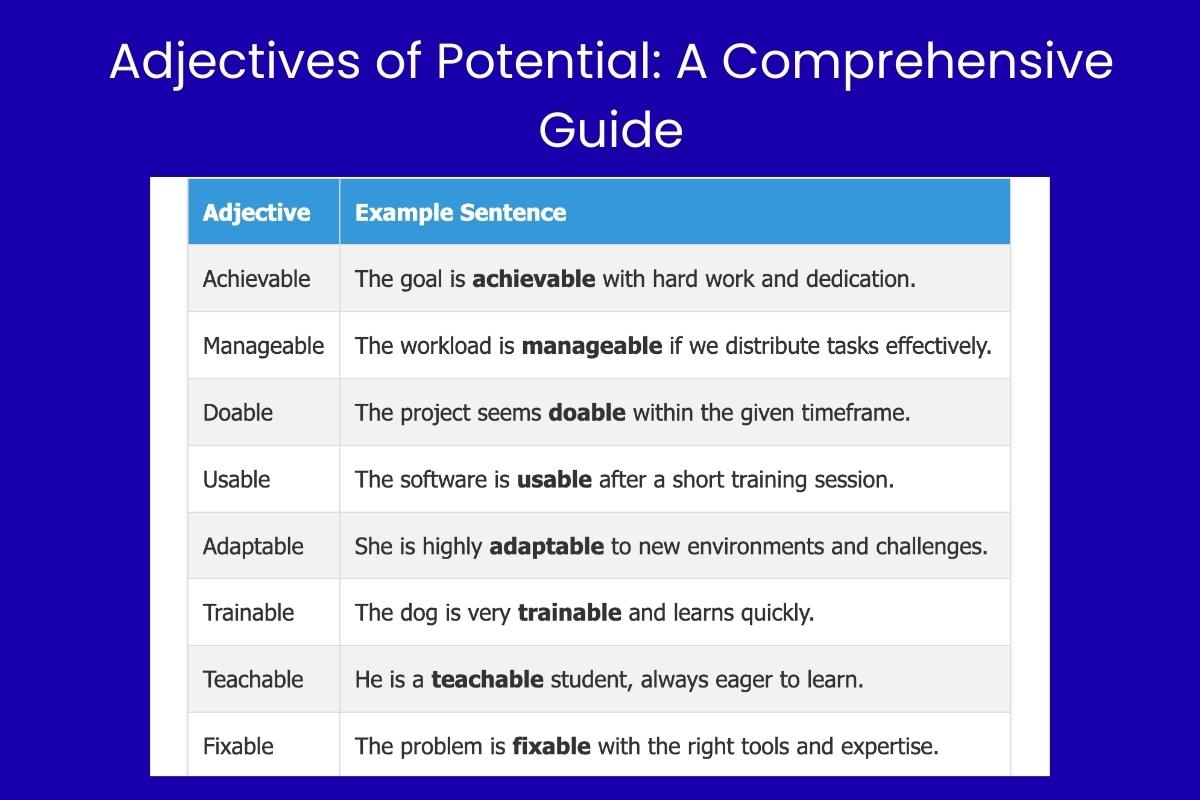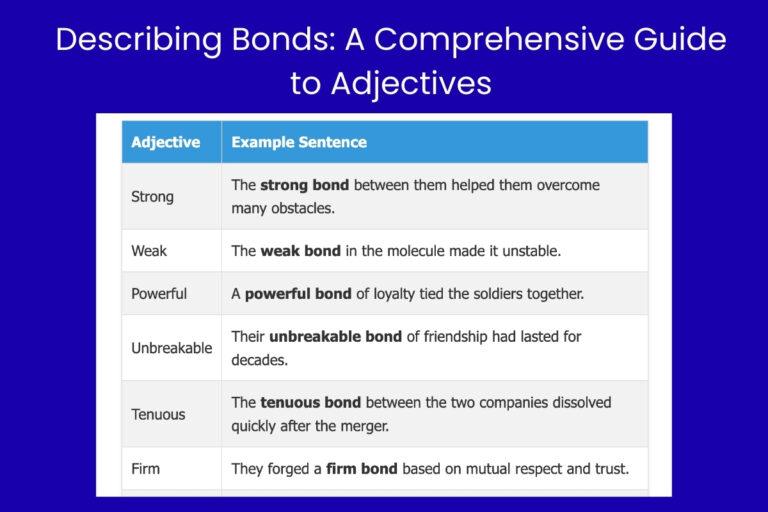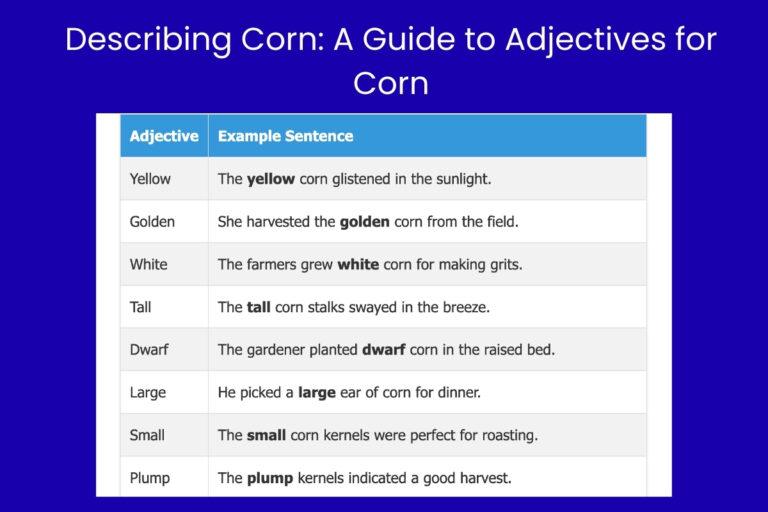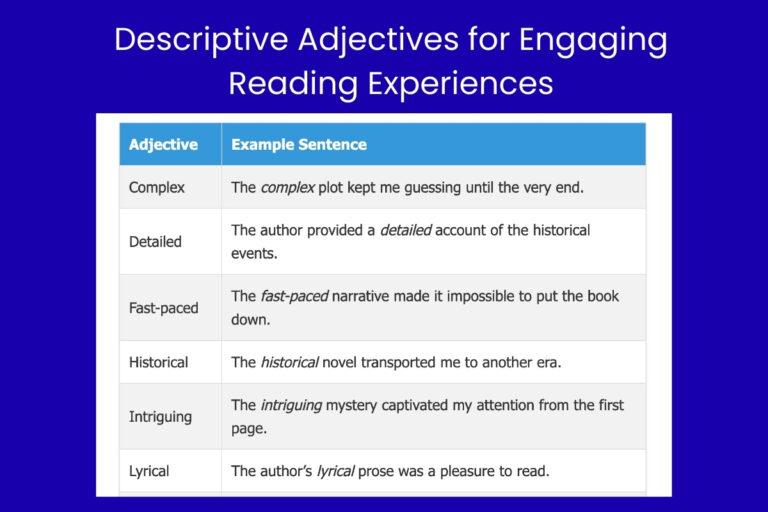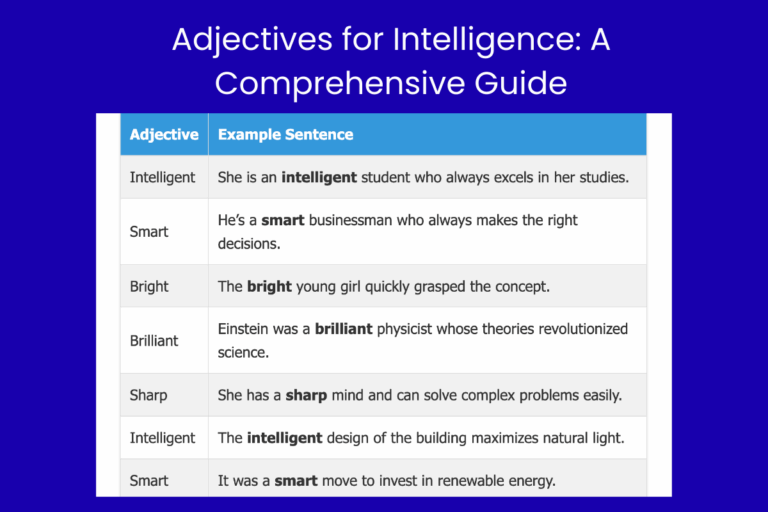Adjectives of Potential: A Comprehensive Guide
Adjectives of potential are crucial for expressing possibilities, capabilities, and future prospects. Mastering these adjectives allows you to articulate what someone or something is capable of achieving or becoming. This comprehensive guide explores the definition, structure, types, usage rules, and common mistakes associated with adjectives of potential. Whether you are an English language learner, a student preparing for exams, or simply someone looking to enhance their writing skills, this article will provide you with the knowledge and practice needed to confidently use adjectives of potential in your everyday communication.
Table of Contents
- Introduction
- Definition of Adjectives of Potential
- Structural Breakdown
- Types of Adjectives of Potential
- Examples of Adjectives of Potential
- Usage Rules
- Common Mistakes
- Practice Exercises
- Advanced Topics
- FAQ
- Conclusion
Definition of Adjectives of Potential
Adjectives of potential describe the inherent capacity or possibility that someone or something possesses. They indicate what could be, what is likely to happen, or what a person or object is capable of achieving. These adjectives are essential for expressing future possibilities, inherent qualities, and the latent capabilities of subjects. Understanding these adjectives is crucial for nuanced and precise communication.
These adjectives often derive from verbs or nouns and are modified to indicate potential. For example, the verb achieve can be transformed into the adjective achievable, indicating something that has the potential to be achieved. Similarly, the noun success can become the adjective successful, describing someone or something with the potential for success. The context in which these adjectives are used further refines their meaning.
Structural Breakdown
Adjectives of potential are typically formed by adding suffixes to nouns or verbs. These suffixes transform the original word into an adjective indicating capability or possibility. Understanding these structural elements helps in recognizing and forming such adjectives.
Common Suffixes
- -able / -ible: Indicates capability or suitability. Examples: readable, visible.
- -ive: Indicates a tendency or quality. Examples: creative, sensitive.
- -ful: Indicates being full of or characterized by. Examples: successful, powerful.
- -ent / -ant: Indicates performing or causing. Examples: dependent, reliant.
- -ous: Indicates possessing a quality. Examples: courageous, dangerous.
The base word (noun or verb) often undergoes slight modifications before the suffix is added to ensure proper pronunciation and grammatical correctness. For instance, when adding ‘-able’ to ‘desire’, the ‘e’ is dropped, resulting in ‘desirable’. Recognizing these modifications is key to correctly forming adjectives of potential.
Types of Adjectives of Potential
Adjectives of potential can be categorized based on the specific aspect of potential they describe. Understanding these categories allows for a more nuanced and accurate use of these adjectives.
Capability Adjectives
These adjectives describe the inherent ability or capacity of someone or something to perform a specific action or achieve a particular outcome. They emphasize the inherent qualities that make something possible.
Possibility Adjectives
These adjectives indicate that something is possible or likely to occur, based on current circumstances or conditions. They highlight the likelihood of a particular event or outcome.
Suitability Adjectives
These adjectives describe whether something is appropriate or fitting for a specific purpose or situation. They emphasize the appropriateness of a person or thing for a given context.
Examples of Adjectives of Potential
The following tables provide examples of adjectives of potential, categorized for clarity. Each category is further illustrated with sentences to demonstrate their usage in context.
Capability Adjectives Examples
This table shows a variety of capability adjectives, demonstrating the inherent ability of a subject to perform an action or achieve a result. The examples illustrate how these adjectives are used in sentences.
| Adjective | Example Sentence |
|---|---|
| Achievable | The goal is achievable with hard work and dedication. |
| Manageable | The workload is manageable if we distribute tasks effectively. |
| Doable | The project seems doable within the given timeframe. |
| Usable | The software is usable after a short training session. |
| Adaptable | She is highly adaptable to new environments and challenges. |
| Trainable | The dog is very trainable and learns quickly. |
| Teachable | He is a teachable student, always eager to learn. |
| Fixable | The problem is fixable with the right tools and expertise. |
| Curable | The disease is curable with early detection and treatment. |
| Renewable | Solar energy is a renewable source of power. |
| Sustainable | The project aims to create a sustainable environment. |
| Profitable | The business venture proved to be highly profitable. |
| Marketable | The product is highly marketable due to its unique features. |
| Portable | The device is lightweight and portable. |
| Durable | The furniture is made from durable materials. |
| Audible | The sound was barely audible from the distance. |
| Visible | The stars are visible on a clear night. |
| Edible | These berries are edible and safe to eat. |
| Solvable | The puzzle is solvable with careful thought. |
| Navigable | The river is navigable by small boats. |
| Negotiable | The price is negotiable depending on the terms. |
| Reversible | The decision is not reversible once it’s made. |
| Convertible | The sofa is convertible into a bed. |
| Expendable | The resources are expendable for the project. |
| Retrievable | The data is retrievable from the backup. |
| Washable | The fabric is washable and easy to clean. |
| Changeable | The weather is changeable in this region. |
| Eradicable | The disease is potentially eradicable with global efforts. |
Possibility Adjectives Examples
This table lists possibility adjectives, which indicate that something is likely or has the potential to occur. The sentences illustrate the use of these adjectives to describe future events or outcomes.
| Adjective | Example Sentence |
|---|---|
| Potential | He is a potential candidate for the job. |
| Likely | It is likely to rain tomorrow. |
| Probable | The outcome is probable given the current circumstances. |
| Possible | It is possible to achieve anything with dedication. |
| Eventual | Eventual success requires perseverance. |
| Future | The future benefits are yet to be seen. |
| Forthcoming | The announcement is forthcoming next week. |
| Emerging | She is an emerging talent in the field. |
| Developing | The country is a developing economy. |
| Growing | There is a growing interest in renewable energy. |
| Upcoming | The upcoming event is highly anticipated. |
| Prospect | The project has a good prospect of success. |
| Hopeful | We are hopeful for a positive outcome. |
| Promising | The research shows promising results. |
| Expected | The delivery is expected by Friday. |
| Anticipated | The changes are anticipated in the new year. |
| Threatened | The species is threatened by habitat loss. |
| Vulnerable | The elderly are vulnerable to the flu. |
| Susceptible | Children are susceptible to certain diseases. |
| Conditional | The agreement is conditional on certain terms. |
| Predictable | The outcome was predictable based on the data. |
| Awaited | The results are eagerly awaited. |
| Imminent | The storm is imminent. |
| Possible | It’s possible to find a solution. |
| Conceivable | It’s conceivable that prices will drop. |
| Feasible | The plan is feasible with enough resources. |
| Viable | The business model is viable in the long term. |
| Plausible | His explanation seems plausible. |
Suitability Adjectives Examples
This table provides examples of suitability adjectives, describing how appropriate something is for a particular situation or purpose. The sentences illustrate the context in which these adjectives are used.
| Adjective | Example Sentence |
|---|---|
| Suitable | This dress is suitable for the occasion. |
| Appropriate | The behavior was not appropriate for the workplace. |
| Fitting | The tribute was a fitting way to honor him. |
| Qualified | She is a qualified candidate for the position. |
| Eligible | You are eligible for the scholarship. |
| Capable | He is capable of handling the responsibility. |
| Competent | The team is competent and efficient. |
| Adequate | The resources are adequate for the task. |
| Ready | The team is ready for the challenge. |
| Prepared | They are well prepared for the presentation. |
| Worthy | He is worthy of the award. |
| Deserving | The charity is deserving of our support. |
| Advantageous | The deal is advantageous for both parties. |
| Beneficial | The exercise is beneficial for your health. |
| Helpful | The advice was very helpful. |
| Convenient | The location is convenient for transportation. |
| Opportune | The timing was opportune for the investment. |
| Timely | The intervention was timely and prevented further damage. |
| Relevant | The information is relevant to the discussion. |
| Applicable | The rules are applicable to all employees. |
| Apt | His analogy was apt and insightful. |
| Expedient | It was expedient to take a shortcut. |
| Prudent | It’s prudent to save for the future. |
| Strategic | The move was strategic and well-planned. |
Usage Rules
Using adjectives of potential correctly involves understanding their specific meanings and grammatical roles. These adjectives typically modify nouns, describing their potential qualities or capabilities. Following these rules ensures clarity and accuracy in communication.
Placement
Adjectives of potential are usually placed before the noun they modify (attributive position). However, they can also follow a linking verb (predicative position).
Agreement
Adjectives in English do not change form to agree with the number or gender of the noun they modify. This simplifies their usage compared to languages with grammatical gender and number agreement.
Contextual Usage
The meaning of an adjective of potential can vary depending on the context. Consider the specific situation and intended meaning when choosing the appropriate adjective.
Common Mistakes
Several common mistakes can occur when using adjectives of potential. Recognizing and avoiding these errors will improve the accuracy and clarity of your writing.
Incorrect Suffixes
Using the wrong suffix can change the meaning of the word or create a non-existent word. For example, confusing ‘-able’ with ‘-ful’ can lead to errors.
Misunderstanding Meaning
Failing to grasp the specific nuance of an adjective can lead to inappropriate usage. It’s important to understand the subtle differences between similar adjectives.
Overgeneralization
Using adjectives too broadly without considering the specific context can make your writing vague. Be precise and choose adjectives that accurately reflect the intended meaning.
Here are some examples of common mistakes:
| Incorrect | Correct | Explanation |
|---|---|---|
| The task is achieveful. | The task is achievable. | Using the correct suffix ‘-able’ to indicate capability. |
| He is a potential successful man. | He is a potentially successful man. | Using an adverb to modify the adjective ‘successful’. |
| The problem is solveful. | The problem is solvable. | Using the correct suffix ‘-able’ to indicate capability. |
| The plan is manageful. | The plan is manageable. | Using the correct suffix ‘-able’ to indicate capability. |
Practice Exercises
These practice exercises provide opportunities to apply your understanding of adjectives of potential. Each exercise focuses on different aspects of their usage.
Exercise 1: Fill in the Blanks
Fill in the blanks with the appropriate adjective of potential from the word bank provided.
Word Bank: achievable, possible, suitable, manageable, adaptable
| Question | Answer |
|---|---|
| 1. The goal is _______ with hard work. | achievable |
| 2. It is _______ to travel to Mars in the future. | possible |
| 3. This dress is _______ for the party. | suitable |
| 4. The workload is _______ if we divide the tasks. | manageable |
| 5. She is very _______ to new situations. | adaptable |
| 6. The damage is _______ with the right tools. | fixable |
| 7. The data is _______ from the backup server. | retrievable |
| 8. The schedule is _______ to changes. | changeable |
| 9. He is a _______ candidate for the job. | potential |
| 10. The results are _______ in the coming weeks. | expected |
Exercise 2: Sentence Completion
Complete each sentence using an adjective of potential that makes sense in the context.
| Question | Answer |
|---|---|
| 1. The task is _______ if we break it into smaller steps. | doable |
| 2. The software is _______ after the update. | usable |
| 3. The dog is very _______ and eager to please. | trainable |
| 4. The problem is _______ with a creative solution. | solvable |
| 5. The river is _______ by experienced sailors. | navigable |
| 6. The price is _______ within reason. | negotiable |
| 7. The decision is not _______ once it is finalized. | reversible |
| 8. The sofa is _______ into a comfortable bed. | convertible |
| 9. The resources are _______ for the project’s success. | expendable |
| 10. The fabric is _______ and easy to maintain. | washable |
Exercise 3: Error Correction
Identify and correct the errors in the following sentences related to adjectives of potential.
| Incorrect Sentence | Correct Sentence |
|---|---|
| 1. The goal is achieveful with effort. | The goal is achievable with effort. |
| 2. He is a potential succeed person. | He is a potentially successful person. |
| 3. The task is manageful by the team. | The task is manageable by the team. |
| 4. The problem is solveful with creativity. | The problem is solvable with creativity. |
| 5. The software is usefully after training. | The software is usable after training. |
| 6. The food is eatable for humans. | The food is edible for humans. |
| 7. The water is drinkful after filtration. | The water is drinkable after filtration. |
| 8. The task is doful with focus. | The task is doable with focus. |
| 9. The dog is trainfully with patience. | The dog is trainable with patience. |
| 10. The student is teachful and eager. | The student is teachable and eager. |
Advanced Topics
For advanced learners, understanding the nuances and complexities of adjectives of potential can further refine their language skills. This section covers more intricate aspects of their usage.
Subtleties of Meaning
Explore the subtle differences between similar adjectives of potential. For example, understand the difference between “possible” and “probable” in various contexts. Recognizing these nuances allows for more precise and effective communication.
Figurative Usage
Examine how adjectives of potential are used figuratively in literature and other forms of creative writing. Understanding their metaphorical applications can enrich your appreciation of language.
Cross-Linguistic Comparisons
Compare how different languages express the concept of potential through adjectives or other grammatical structures. This comparative analysis can provide deeper insights into the nature of language and thought.
Frequently Asked Questions
This section addresses common questions that learners have about adjectives of potential.
- What are adjectives of potential?
Adjectives of potential describe the inherent capacity or possibility that someone or something possesses. They indicate what could be, what is likely to happen, or what a person or object is capable of achieving.
- How are adjectives of potential formed?
Adjectives of potential are typically formed by adding suffixes such as ‘-able’, ‘-ible’, ‘-ive’, ‘-ful’, ‘-ent’, ‘-ant’, or ‘-ous’ to nouns or verbs. For example, ‘read’ becomes ‘readable’.
- Can you give examples of adjectives of potential in a sentence?
Certainly! Here are a few examples: “The goal is achievable with hard work.” “It is possible to travel to Mars in the future.” “This dress is suitable for the occasion.”
- What is the difference between ‘possible’ and ‘probable’?
‘Possible’ indicates that something can happen or exist, while ‘probable’ suggests that something is likely to happen based on current evidence or conditions. ‘Possible’ is a broader term, while ‘probable’ implies a higher degree of likelihood.
- How do I avoid common mistakes when using adjectives of potential?
To avoid common mistakes, pay close attention to the correct suffixes, understand the specific meanings of the adjectives, and consider the context in which you are using them. Review examples and practice exercises to reinforce your understanding.
- Where should I place adjectives of potential in a sentence?
Adjectives of potential are usually placed before the noun they modify (attributive position), such as “a potential candidate.” They can also follow a linking verb (predicative position), such as “The candidate is potential.”
- Are there any exceptions to the rules of forming adjectives of potential?
Yes, there are exceptions. Some words may require slight modifications before adding a suffix, and some adjectives of potential do not follow the standard suffix patterns. These exceptions are often learned through exposure and practice.
- How can I improve my understanding and use of adjectives of potential?
To improve your understanding, read widely, pay attention to how native speakers use these adjectives, practice forming your own sentences, and seek feedback from teachers or language partners. Consistent practice is key to mastering adjectives of potential.
Conclusion
Adjectives of potential are indispensable for expressing possibilities, capabilities, and future prospects. By understanding their definition, structure, types, usage rules, and common mistakes, you can effectively communicate nuanced meanings and enhance your writing skills. Consistent practice and attention to detail are key to mastering these adjectives and enriching your overall command of the English language.
Continue to explore and practice using adjectives of potential in various contexts. Pay attention to how native speakers use them in their writing and speech. With dedication and practice, you will become proficient in using these powerful adjectives to express a wide range of possibilities and capabilities.
